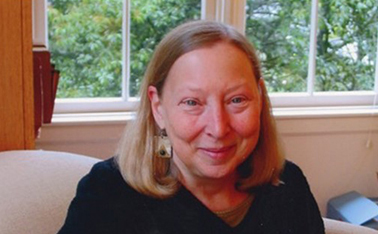This post was written by CCCC Past Chairs Cheryl Glenn and Andrea Lunsford.
September 29, 2021—20 days after her 74th birthday, Lisa Ede shuffled off this mortal coil, the field of rhetoric and writing studies lost one of its bright lights, and the world lost the friend of a lifetime. In the few days since her death, we have been heartened by the outpouring of tributes and testimonials from friends and colleagues across the country, and beyond, by all those who spoke of what Lisa and her work meant to them, of the many acts of kindness, of mentorship, of unflagging support she was so well known for. And as we’ve smiled through tears, we recall Marvin Diogenes saying “Lisa gives the best hugs.” She did indeed. And so much more.
Before the days of rhetoric and composition graduate programs, Lisa became one of the earliest pioneers in this new field—despite her rich literary training. A gifted Victorianist, Lisa was a teacher at heart, and this burgeoning field of “rhetcomp” offered Lisa the intellectual space to expand her disciplinary expertise and enrich her pedagogy. Many of us first came to know Lisa as the wondrous scholar—the Oregon State University professor who was honored with the CCCC Braddock Award and the MLA Mina Shaughnessy Award, with an Oregon State symposium on her work, and with the Lisa Ede Mentoring Award given by the Coalition of Feminist Scholars in the History of Rhetoric and Composition. Many of us know her only by these bare outlines of her rich and full career.
But those of us who are the lucky ones also knew the Lisa who is receiving cascades of online accolades for her sincerity, generosity, and lovingkindness. Yes, she was all those things and more: she was beautiful. She was an avid outdoorswoman with a keen appreciation of our natural world. She was a cookbook hound (later an avid watcher of the Food Network) and a fantastic, even daring, cook and host. She was an admirably promiscuous reader of theory, literature, the natural world, and, of course, cookbooks. She was a strong supporter of the arts, of music, dance, and the visual arts, of course, given that she was married for 47 years to Greg Pfarr, an acclaimed painter and printmaker. And she was an intensely loyal and always caring partner, in-law, sister, aunt, friend, and colleague.
Those of us who knew her well experienced her occasional stubbornness, which now seems “charming.” But even when we went up against her strong will, we never doubted that she loved and cared about us. Never. She loved us, and we loved her—and we love her still, along with the family friends, former students, and colleagues near and far that she leaves behind.
In the days since her death, we have been drawn to a poem Lisa loved:
When despair for the world grows in me
and I wake in the night at the least sound
in fear of what my life and my children’s lives may be,
I go and lie down where the wood drake
rests in his beauty on the water, and the great heron feeds.
I come into the peace of wild things
who do not tax their lives with forethought
of grief. I come into the presence of still water.
And I feel above me the day-blind stars
waiting with their light. For a time
I rest in the grace of the world, and am free.
—Wendell Berry, “The Peace of Wild Things”
What we wish today, for all teachers of writing everywhere, is that you have a friend like Lisa—and that you can, as often as possible, rest in the grace of the world.
It is the policy of NCTE in all publications, including the Literacy & NCTE blog, to provide a forum for the open discussion of ideas concerning the content and the teaching of English and the language arts. Publicity accorded to any particular point of view does not imply endorsement by the Executive Committee, the Board of Directors, the staff, or the membership at large, except in announcements of policy, where such endorsement is clearly specified.

